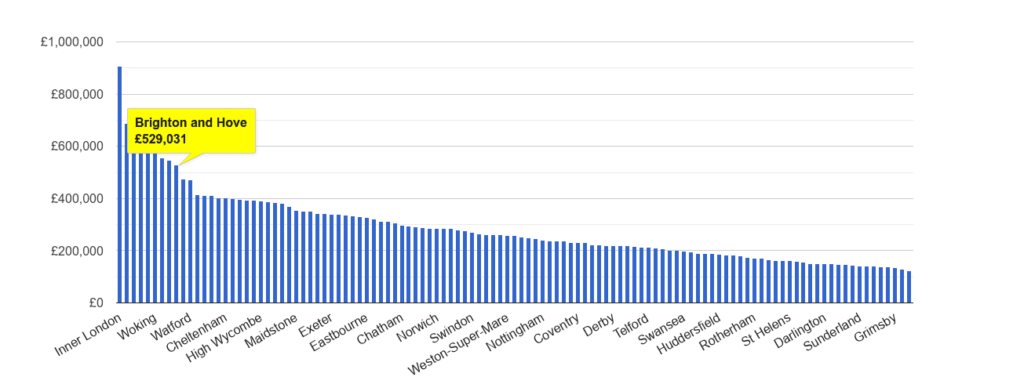
Brighton, often referred to as ‘London-by-the-Sea’, has been a hotspot for property buyers and investors for years. Its unique blend of seaside charm, vibrant cultural scene, and proximity to the capital has made it a sought-after location. However, in recent times, the burning question on many potential homebuyers’ and investors’ minds is: “Are house prices falling in Brighton?”
In this blog post, we’ll dive deep into the current state of the housing market in Brighton, exploring various factors that influence property prices and trying to understand the trajectory of the market.
The Current State of Brighton’s Housing Market
The past decade has seen substantial growth in Brighton’s property prices. The boom was driven by various factors, including Brighton’s increasing appeal as a lifestyle destination, improved transport links to London, and a general trend of rising property prices across the UK.
However, like all markets, the property sector in Brighton has its ups and downs. To ascertain whether house prices are indeed falling, one must examine several indicators:
- Historical Data: Looking at the trends over the past year or two can give us a clearer picture of where the market might be headed.
- Supply and Demand: An increase in properties for sale coupled with decreased demand can lead to a drop in prices.
- Economic Factors: Interest rates, employment rates, and broader economic trends can heavily influence the property market.
Factors Influencing Brighton’s Property Market
Several factors could be causing shifts in the Brighton housing market:
- Economic Uncertainty: Periods of economic uncertainty can make people hesitant to invest in property, awaiting more stability.
- Brexit: The UK’s decision to leave the EU introduced a degree of uncertainty in many sectors, including property.
- Pandemic Impact: COVID-19 has impacted property markets worldwide. Some areas have seen a surge in demand due to the shift to remote work, while others have seen a decline.
Brighton’s Unique Position
Despite broader market trends, Brighton has unique factors that might insulate it from significant downturns:
- Continued Demand: Brighton’s allure as a city isn’t just its property market. The lifestyle, cultural scene, and general vibrancy of the city continue to attract people.
- Limited Space: Being nestled between the sea and the South Downs, Brighton doesn’t have the same potential for expansion as other cities. This limited supply can support prices.
What the Experts Say
Local estate agents and property experts have varied opinions on the matter. Some believe that while there might be a short-term adjustment, Brighton’s property market remains robust due to its unique position and appeal. Others argue that it might be aligning more with national or global property trends.
Is It the Right Time to Buy or Sell?
If you’re considering buying or selling property in Brighton, here are some things to consider:
- Purpose: If you’re buying a home to live in, short-term market fluctuations might be less relevant than if you’re looking for a quick return on an investment.
- Long-term Perspective: Property is often a long-term investment. Even if prices in Brighton are adjusting, consider the long-term value and potential growth over the years.
- Negotiation Power: A market that’s cooling down can offer buyers more negotiation power.
Factors Influencing Hove House Prices
- Proximity to Brighton: Being adjacent to Brighton, Hove benefits from many of the same amenities, including shops, restaurants, bars, and cultural attractions. However, Hove tends to offer a slightly more relaxed vibe, which can be appealing to certain homebuyers.
- Transport Links: With its railway station and convenient bus routes, Hove provides excellent transport links, making it attractive for those commuting to Brighton, London, or other parts of the South East.
- Types of Properties: Hove boasts a range of properties, from grand Victorian and Edwardian homes to more modern apartment buildings. The preservation of its period properties has made it a hub for those looking for character homes.
- Economic and External Factors: As with all property markets, broader economic conditions, interest rates, political scenarios (like Brexit), and global events (like the COVID-19 pandemic) can impact house prices.
How to Calculate Average Price
- Sum of Values: First, you’ll need to add together all the prices (or values) you have.
- Divide by Count: After obtaining the sum, you then divide it by the number of individual prices (or values) to get the average.
Property Type
Property type refers to the specific category or classification of real estate based on its use or design. Understanding property types is vital for real estate investors, homeowners, and industry professionals as it dictates the property’s utility, market demand, price range, and more.
Conclusion:
The definitive answer to the question, “Are house prices falling in Brighton?” isn’t a simple ‘yes’ or ‘no’. While certain indicators suggest a cooling down of the market, others hint at the city’s enduring appeal, which might prevent significant downturns.
As with all property markets, Brighton’s will continue to ebb and flow. However, its charm, lifestyle, and unique geographical position ensure that it remains one of the UK’s property jewels. Whether you’re an investor, a first-time buyer, or someone looking to relocate, it’s always wise to consult local experts, keep an eye on broader trends, and remember that property is often a game of patience and strategy.
You can find more information on our website, Weatherill Property Group

Recent Comments